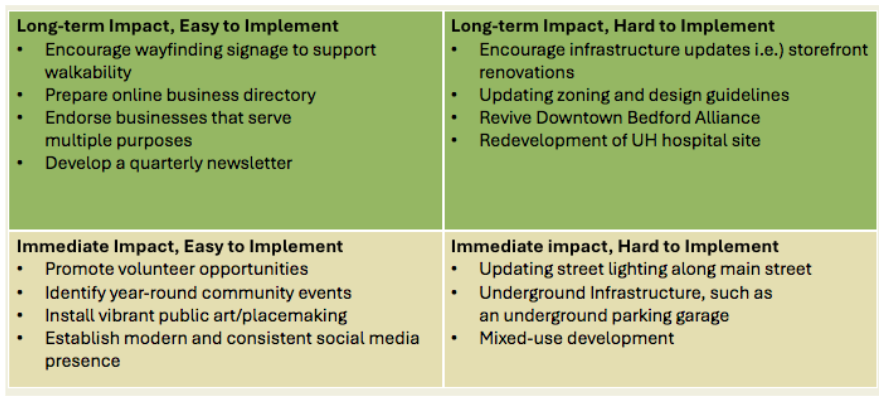Implementation Strategies
Downtown Bedford already has strong foundational assets: a historic downtown core with a small-town feel, public greenspaces ideal for events, and a walkable environment. By implementing low- and high-impact initiatives, Bedford can create stronger ties amongst residents and attract new visitors.
Feasibility Summary
The Bridging Bedford initiative outlines a comprehensive approach to revitalizing the historic downtown district by blending actionable short-term goals with long-term strategies that enhance connectivity, economic development, and community engagement. A central tool in this process is the implementation matrix, which categorizes projects by their impact and ease of execution. Immediate, easy-to-implement actions such as promoting volunteerism, hosting community events, and enhancing social media presence can quickly build momentum and foster civic pride. Meanwhile, longer-term initiatives—like developing wayfinding signage, launching a quarterly newsletter, and preparing zoning updates—lay the groundwork for sustained growth and community cohesion.
To promote the effective usage of funding, the downtown Bedford Historic District should focus on making high-impact changes that are easy to implement. Some examples of these actions could be enhancing wayfinding signage, building a business directory, or even implementing quarterly newsletters that promote upcoming events and happenings in the district.
Community Engagement Strategies
Community Events
Historic Walking Tours of Downtown
Highlighting Bedford’s rich history through guided walking tours would activate the downtown space while educating the community and visitors. Tours could be led by volunteers, city staff, or historical society members. Initially operating by appointment and supported by strategic marketing, tours could evolve into a regular, well-attended program. Moreover, they would encourage collaboration among local organizations, further strengthening community bonds.
Farmer’s Markets
The City of Bedford could organize a monthly farmers market from May to October, featuring 10–15 local businesses or farmers. With support from a future chamber of commerce, event planning could be streamlined by building connections to local producers. A recurring farmers market would offer fresh produce, promote small businesses, and activate the downtown space.
Pop-Up Events
Similar to the farmers market, pop-up events would give small businesses—particularly those selling textiles, prepared foods, or artisan goods—a venue to promote their products. Themed pop-ups (e.g., Halloween, Mother’s Day, or Back-to-School) could create additional excitement and allow for curated vendor lists. Pop-up events could be held monthly from May to October, with special indoor promotions during the winter months, such as comedy shows at Los Gallos or a tire repair class at The Broadway Cyclery.
Volunteering
Advocacy Groups
Residents seeking deeper civic engagement could form neighborhood block groups, women’s or men’s clubs, or other citizen-driven organizations. Another example could be engaging the Bedford Gardening Club to connect their programs to annual events or implement a beautification project to improve landscaping along the downtown core. Participatory engagement provides a platform for community members to advocate for positive change, feel empowered, and invest in their community’s future.
Community Clean-Ups
Hosting city-wide clean-up days encourages residents of all ages, from families with young children to seniors, to take part in beautifying their surroundings. These inclusive events foster pride and stewardship across the entire community.
Community Service Days
Partnering with small, medium, and large businesses to create Community Service Days invites local employers and their staff to engage in volunteer activities across Bedford. Tailored volunteer opportunities provide great public relations for both the city and participating businesses, while strengthening the community’s connection to its local economy.

